Bean Sprouts Vs Alfalfa Sprouts | A Complete Comparison
Both bean sprouts and alfalfa sprouts have risen to popularity in recent years for their taste, nutrient content, health benefits and unique textures. With the increased consumption we get a lot of questions by growers and buyers about what the specific differences between these two varieties of sprouts are: their different nutrients, tastes, textures, growing, cooking and storage methods. We’ll delve deep into these sprouts to help you to better understand.
Not Much Time? Skip To What You'd Like To Learn...
-
What Are Bean Sprouts?
-
What Are Alfalfa Sprouts?
-
Appearance: Bean Sprouts Vs Alfalfa Sprouts
-
Bean Sprouts Vs Alfalfa Sprouts Taste
-
Health & Nutrient Benefits Of Each
-
How To Grow: A Comparison
-
Comparing Storage Methods
-
Which Contains More Sulforaphane?
-
Specific Diets, Bean And Alfalfa Sprouts
-
Eating Mung Bean Sprouts And Alfalfa Sprouts
-
Common Questions
What Are Bean Sprouts?
Bean sprouts are long, thin, off-white shoots that grow out of the mung bean. Mung beans are commonly found in Asian cuisine, and most commonly in Korean and Thai restaurants. Once mixed with strong an tangy flavors bean sprouts are very enjoyable to eat.
You’ll be able to sprout mung beans at home very quickly, and cheaply. Alternatively you can pick them up at your local Asian grocery store.
Grow Your Pantry have designed and made sprouting trays and kits, that include seeds and guides for easy sprouting. Check out the latest prices of them at Our Store.
What Are Alfalfa Sprouts?
Alfalfa sprouts are thin white shoots with green small leaf like tips. Not to be confused with broccoli sprouts for they look very similar! Alfalfa sprouts are mainly consumed for their purported health benefits as well their distinctly nutty flavor too.
Alfalfa sprouts are more of a trendy sprout to consume, you’ll typically be able to find them at health food stores, such as WholeFoods, or your local Farmer’s market.
Appearance: Bean Sprouts Vs Alfalfa Sprouts
Bean sprouts and alfalfa sprouts are very easy to distinguish just by looking at them. Watch out for the color, shape, size and distinctive green leaves!
Color - Mung beans are an off-white cream color, their whole stem is the same color. Alfalfa sprouts have the same off-white colored stem, however their leaves are green at the top.
Leaf - Alfalfa sprouts have a small green leaf on top of their shoots. Mung beans are plain and just a small cone like tip, which is the same color as the stem.
Size - Alfalfa sprouts are typically a lot thinner in diameter, they’ll look closer to microgreens or watercress in sprout structure. Whereas bean sprouts tend to be a lot thicker.
Bean Sprouts Vs Alfalfa Sprouts Taste
They both have very distinctive and different tastes, you couldn’t confuse them!
Texture - As the shoots of bean sprouts are a lot thicker when you bite into them they’ll have a characteristic snap and crunch. Alfalfa sprouts, on the other hand, are so much thinner that you would have to take a large handful to get as a distinctive crunch.
Flavor - Bean sprouts are incredibly bland on their own, tasting of nothing but earthy water. Most recipes that incorporate bean sprouts will use strong flavors and utilize bean sprouts for their crunchy texture rather than taste. In contrast, alfalfa has a more mild nutty flavor and when packed into a sandwich gives a great salad crunch too.
Health & Nutrient Benefits Of Each
Bean sprouts shoot from the mung beans whereas alfalfa sprouts come from alfalfa seeds. As they’re two uniquely different sprouts they also have very different health benefits too. We’ll explore 3 health benefits of each below.
3 Bean Sprout Health Benefits
Mung bean sprouts contain high levels of protein, choline, and are great for weight loss too.
High Protein Levels - Mung bean sprouts contain 39% protein! This means per serving you can expect to consume 6% of your daily protein requirements. Making them a perfect low calorie snack. Protein is an essential macronutrient that helps to build and tissue.
High Choline Levels - Choline is less frequently spoken about micronutrient. The official definition: “Choline occurs as a cation that forms various salts. Choline is an essential nutrient for humans and many other animals.” - Source Wikipedia. Choline’s role is to help with cell membrane building, DNA synthesis, and nervous system building. (Source: HealthNewsToday.com).
Very Low In Calories - If you’re looking to lose weight mung beans are perfect to incorporate into your meals, they contain just 31 calories per serving.. You can add a big handful to your stir-frys on even create a giant hot and tangy plate of vegetables. Helping you stay fuller for longer without gaining weight.
3 Alfalfa Sprout Health Benefits
Alfalfa sprouts contain high levels of vitamin K, fiber and other micronutrients too. Here are some of the health benefits of eating alfalfa sprouts.
High In Vitamin K - Vitamin K plays an important role in the bone health of humans, by helping to regulate the calcium levels in blood. 1 Cup of alfalfa sprouts will contain up to 13% of your daily requirement! (Source: Vitamin K Per Cup Of Bean Sprouts)
Fiber - An essential nutrient in helping our bodies maintain health. Fiber has been shown to normalize bowel movements, lower cholesterol levels, and even help you lose weight too (health benefits source)! Just one cup of bean sprouts (33g) will contain 3% of your daily requirement. Fiber is not digested by your body, instead it passes straight through.
Lower Cholesterol - Recent tests on monkeys and rabbits showed that by consuming alfalfa sprouts their cholesterol levels were reduced. After which there were human studies conducted too which showed a reduction of bad cholesterol levels by 17%. (sources: rabbit test, monkey test, human test)
Conclusion
As you can see both have potentially great health benefits, and can be eaten for different reasons. There isn’t a better or worse variety of sprout to eat, eat whichever you enjoy the most!
How To Grow: A Comparison
All sprouts are incredibly easy to grow, requiring very little time, attention, skill or money. However there will be some more subtle differences between sprout varieties for they will take different lengths of time to shoot, and also costing different amounts too.
Which Is Faster To Sprout?
Mung bean sprouts are consistently faster to grow - Mung bean sprouts take roughly 3 days to go from bean to fully grown shoot. In contrast alfalfa sprouts will take 3-5 days to become fully grown.
Which Is Easier To Sprout?
Both require similar amounts of work, starting with the soaking of the bean or seed followed by thoroughly washing them twice per day until fully grown. As mung bean sprouts are typically faster to grow we would have to say that they’re also easier too.
Which Is Cheaper To Sprout?
Mung bean sprouts are cheaper to buy, being roughly $3.50 cheaper per serving than alfalfa seeds. Alfalfa seeds are more notorious for having safety and bacteria issues. It’s likely that the alfalfa seeds have had to go through a much more thorough process to ensure that they’re safe.
When comparing prices we have used the cost per 2oz (56g) as this is the typical amount used when sprouting.
Mung Beans For Sprouting - Country Creek supply mung beans for sprouting at a cost of $9.99 per 12oz. This would work out at roughly $1.67 per 2oz of beans to grow. Click To Check The Latest Price.
Alfalfa Seeds For Sprouting - Food To Live sells an 8oz package of seeds for $20.99. This works out to be $5.24 per 2oz of seeds to grow. Click To Check The Latest Price.
Conclusion
Mung bean sprouts are not only quicker to grow, but also a lot cheaper too. If you’re starting out and looking for a cheap, quick and easy solution we would recommend mung bean sprouts over alfalfa sprouts.
Looking For Sprouting Equipment? Check Out Our Most Recommended Supplies Here...
Comparing Storage Methods
Using the correct and safe method for storage is essential when dealing with sprouts. As they are a high-risk food, for containing contaminants, bacteria, and food poisoning they need to be dealt with care. We’ll review how long each lasts when stored correctly using common methods: refrigerating and freezing.
Which Lasts Longer?
Mung bean sprouts last longer when stored in the fridge and freezer. As mung bean sprouts have a lot thicker shoot they tend to freeze, hold their shape, taste and texture a lot better. Whereas alfalfa being a very thin sprout will wilt and lose its taste and texture.
Types Of Sprout |
Fridge |
Freezer |
Mung Bean Sprout |
2 Weeks |
Up To 3 Months |
Alfalfa Sprout |
2-3 Days |
Not Recommended |
Which Is Easier To Store?
They both take the same length of time to store. To refrigerate and freeze both types of sprout it is simple and easy, it doesn’t require too much work. You also use the same method for storing for all types of sprouts.
Which Contains More Sulforaphane?
Neither type of sprouts contain sulforaphane. To get sulforaphane from a sprout we would recommend that you consume broccoli sprouts.
What Is Sulforaphane?
Sulforaphane is a bioactive chemical that can be found in cruciferous vegetables. Many studies are now focusing on sulforaphane for its purported health benefits, which include protecting against sun damage, brain damage, helping with constipation, antibacterial and even anticancer effects (Source Healthline.com). With so many purported health benefits it’s no wonder so many people are now consuming sprouts.
Alfalfa Sprouts And Sulforaphane - No sulforaphane can be found in alfalfa sprouts, for it is not part of the cruciferous family of vegetables. In fact as it looks so similar to broccoli sprouts, studies use alfalfa sprouts to give to patients as placebos.
Mung Beans And Sulforaphane - Similar to alfalfa sprouts, mung bean sprouts also do not contain any sulforaphane.
Specific Diets, Bean And Alfalfa Sprouts
When following most specific types of diets both bean sprouts and alfalfa sprouts can be consumed. Not only because they’re very low in calorie density, but also because they’re a whole food too.
Ketogenic Diet - You can eat both alfalfa and mung bean sprout whilst following this high fat, low carb diet. As they both contain limited amounts of carbohydrates you can include servings of each in your diet daily.
Paleo Diet - A paleo diet is very strict, you can only have whole foods that were common thousands of years ago. They exclude all legumes and grains too. Although mung bean sprouts come from a legume, it’s generally accepted that you can consume bean sprouts on this diet; alfalfa sprouts can be consumed too. Note: be sure to remove any beans that are still attached to the shoots before consuming, to ensure you don’t consume any legumes.
Whole30 Diet - The whole30 diet takes your diet back to basics and is very restrictive for a 30 day period. They also ban the consumption of legumes for they claim that they contain ‘anti-nutrients’. Similarly to the paleo diet, it’s suggested that you remove the shoot from the legume or grain before eating. Then they’re suitable for consumption.
Eating Mung Bean Sprouts And Alfalfa Sprouts
As they’re two different types of sprouts with differing flavors, textures and sizes the way in which they’re enjoyed is also different.
How To Enjoy Mung Bean Sprouts
Stir Frys - Adding your bean sprouts to your favourite stir fry recipe is a great way to infuse the tasty flavors whilst bulking out your meal and getting the health benefits too.
Salads - Korean cuisine often uses bean sprouts when making salads. They use the strong flavors of chilli, garlic and onions to make this dish stand out.
How To Enjoy Alfalfa Sprouts
Sandwiches - By taking a handful of alfalfa sprouts and add them to your sandwich. Alfalfa sprouts will give a delicious crunch and great additional flavor to any sandwich.
Salads - Topping a salad with a big scoop of sprouts is great, it will break up that almost monotonous taste of salad, making it fun, exciting and tasty to eat.
Common Questions
Are Bean Sprouts And Alfalfa Sprouts The Same?
No they are both different varieties of sprouts. Bean sprouts are shoots that grow from the mung bean, whereas alfalfa sprouts are shoots that grow from alfalfa seeds.
How Much Bean Sprouts Should You Eat Per Day?
It’s not recommended to eat more than one serving of bean sprouts per day. This would be roughly 1 cup or 133g of bean sprouts per day.
Do Alfalfa Sprouts Have Sulforaphane?
No there is no sulforaphane contained within alfalfa sprouts. In fact during sulforaphane medical trials alfalfa sprouts are used to be a placebo.
Why Are Alfalfa Sprouts Dangerous?
Sprouts are considered a high-risk food because they can be contaminated very easily. When growing sprouts are often in a warm environment that contains stagnant water. Both are a recipe for rapid bacteria and mold growth. Be sure to buy your seeds from a reputable supplier, thoroughly wash them and drain every time.
How Do You Eat Sprouts Safely?
The safest way to eat sprouts is to thoroughly cook them before eating. This will ensure that all bacteria has been killed before you eat them.
What Are The Healthiest Sprouts To Eat?
This depends on what you like to eat as well as what health benefits you’re seeking to get. Currently the most popular type of “health sprouts” are broccoli sprouts.
Should You Wash Bean Sprouts?
Yes you should wash bean sprouts thoroughly twice per day when sprouting, before storing and cooking.
Does Freezing Bean Sprouts Kill Bacteria?
No, when you freeze food the bacteria will become dormant. Upon thawing the bacteria will become active again multiplying, and potentially infecting your food.
Does Cooking Bean Sprouts Destroy Nutrients?
When cooking bean sprouts the vitamin content will decrease. The best way to preserve the nutrients and cook would be to steam your sprouts.
Are Bean Sprouts Safe To Eat Raw?
It is not recommended to eat bean sprouts raw as they are a high-risk food. Therefore potentially containing harmful bacteria, which could give you food poisoning.
Does Freezing Bean Sprouts Increase Sulforaphane?
No, bean sprouts do not contain sulforaphane therefore it will increase upon freezing. However if you freeze broccoli sprouts, which contain high amounts of sulforaphane, the concentration will increase by 2x!
Can You Eat Too Many Bean Sprouts?
Like all food, you should only eat the daily recommended amount of bean sprouts and not more, especially if you’ve never eaten them before.
Do Bean Sprouts Get Moldy?
Yes Bean sprouts can get moldy. Most commonly they will become moldy if you leave them in stagnant water for too long. Be sure to drain them thoroughly after every wash,
Are Alfalfa Sprouts Bad For You?
No alfalfa sprouts are actually very healthy. They contain high amounts of minerals, vitamins and nutrients. Just make sure that you source your sprouts from a reputable supplier or if growing at home find a trustworthy supplier of seeds.
Are Broccoli Sprouts The Same As Alfalfa Sprouts?
No, these are two distinctly different types of sprouts. The broccoli sprouts come from broccoli seeds whereas alfalfa sprouts come from alfalfa seeds. They have their own unique taste and flavor. However they do look very similar.
Does Cooking Sprouts Kill Bacteria?
When you raise the temperature of food the bacteria dies. Therefore it’s recommended to cook your sprouts to kill all bacteria.
Can You Eat Alfalfa Sprouts Raw?
For people with weakened immune systems, such as pregnant women, elderly people, young people and those with immune system illnesses you should never eat raw sprouts. For others there still carries a high risk however there are many sellers in grocery stores that sell raw alfalfa sprouts to be consumed.


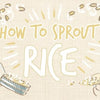

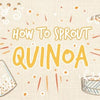
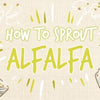
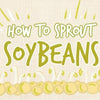
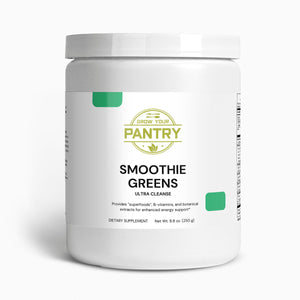
Your entire sprouting info library (29 articles) is impressive and informative. I intend to try buckwheat next. Can’t wait.
I sprout quite a bit, but only with limited varieties. I sprout alfalfa, and single and mixture blends of beans…..If I may, I’d like to add a few tidbits from my own experience that may encourage others to try this inexpensive and fun way of growing one’s own pantry.
1). Once you’ve found a sprout seed you like, buy in bulk…Most sprouting seed providers will provide silica packets that will prevent moisture from ruining your seeds over long periods of time…..The bulk alfalfa seeds I use are about 3 years old and are still perfect for sprouting every time…..Also when buying in large bulk, look for seeds packaged in mylar, OR, reseal opened bags in another good zip-lock bag after squeezing out excess air. Store in cool and dark spaces.
2). Safety: I have never experienced a sickness from eating my own pantry-grown alfalfa sprouts. But it’s common if one is not careful……Following Susan Grey’s specific instructions will prevent most issues. However, many say the hulls of the alfalfa seed are most likely to carry the unwanted bacteria we fear…As alfalfa seeds sprout, the hulls break open, especially during the “greening” stage on the kitchen window sill…..Because of those opinions, I use a wider holed screen to extract as many hulls as possible at that stage. I still like some of the hulls in my finished alfalfa sprouts because they make them look pretty, but I take caution.
3). Storage and serving: I like “young” bean sprout blends that produce between 1/2 to 1 inch sprouts, with the actually bean remaining intact. I always blanche them for safety for 5-6 minutes. Then I add them to a fresh lemon-based vinaigrette with other ingredients. Within my family, my Mufalletta Olive Salad is famous. The standard recipe is mixed with a blend of chickpea, green pea, mung and adzuki bean sprouts, that absorb the standard mufalletta flavors overnight. And the fresh lemon preserves them for several days…….I have also pickled these young bean sprouts with rice vinegar, sesame oil, fish sauce, ginger, garlic and chives for side dish or topping for Asian dishes……..Bottom line, acid will preserve a blanched and young bean sprout for a week or more.
Thanks for letting me post.